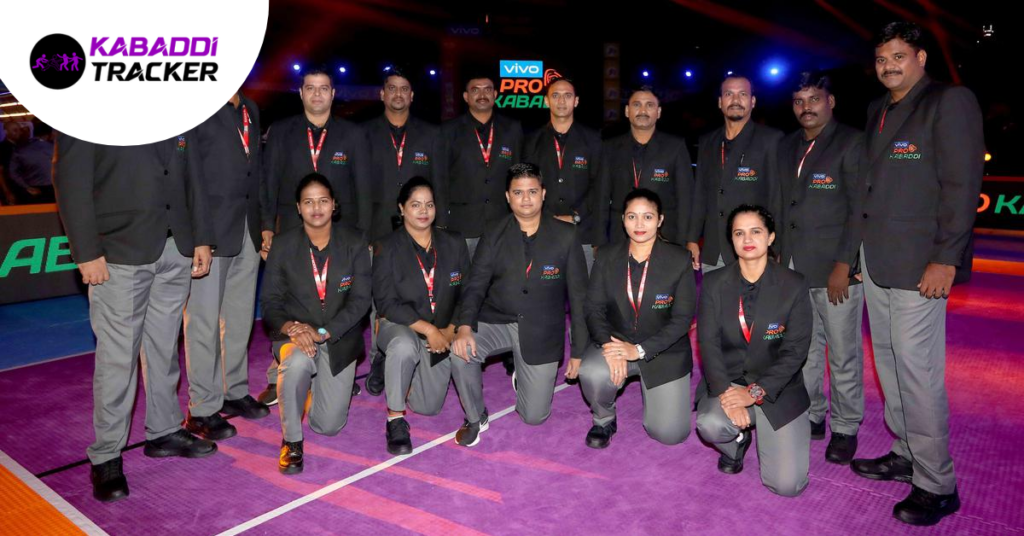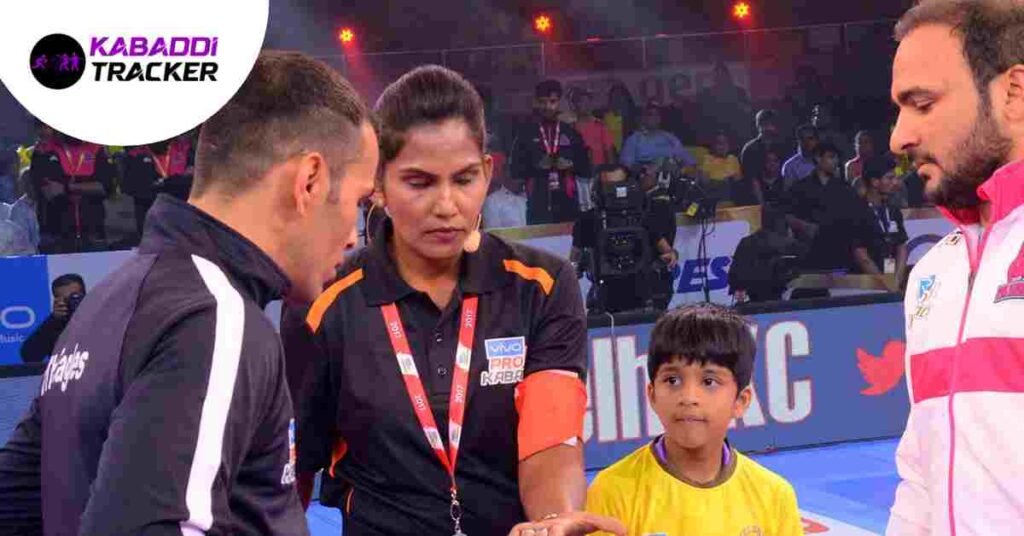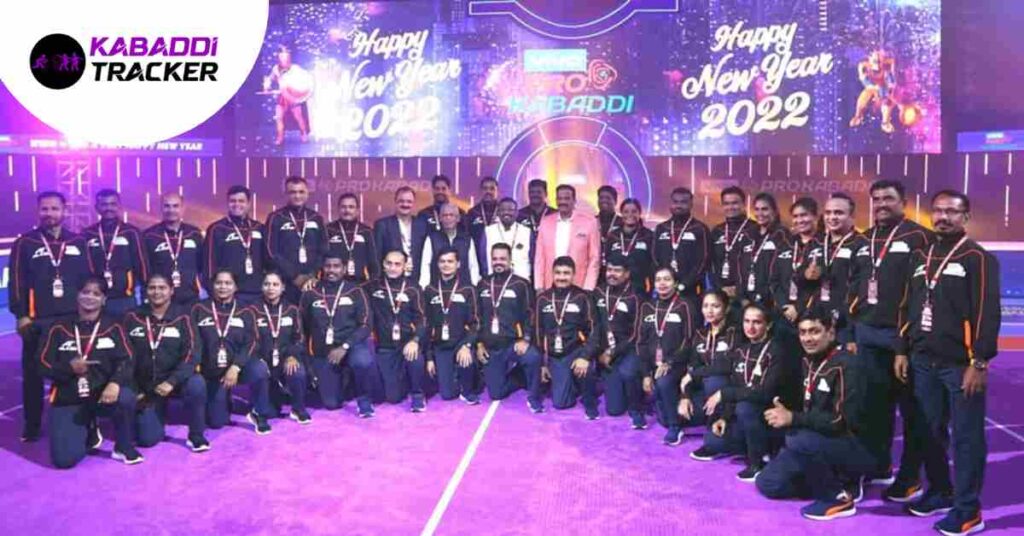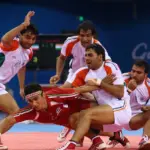In the realm of sports, referees play a vital role in upholding fairness, maintaining discipline, and ensuring the smooth conduct of the game. Kabaddi, a dynamic and traditional sport that has gained international recognition, is no exception. The art of becoming a professional Kabaddi referee involves a deep understanding of the game’s rules, impeccable judgment, quick decision-making abilities, and a passion for fostering sportsmanship.
In this article delves into the comprehensive journey of how to become a professional Kabaddi referee, outlining the steps, skills, and dedication required to excel in this honorable role.
The Road to Professional Kabaddi Refereeing: A Detailed Guide

1. Understanding the Game:
Before embarking on the path of a Kabaddi referee, it’s crucial to have a solid grasp of the game itself. Kabaddi is a team sport that requires two teams to take turns sending a “raider” into the opponent’s half to tag as many defenders as possible and return to their own half without being caught. Referees need to comprehend the nuances of raiding, defending, points scoring, and the rules that govern them.
2. Get Involved in the Kabaddi Community:
Engaging with the Kabaddi community is a vital step towards becoming a professional referee. Attend local matches, leagues, and tournaments to observe how experienced referees handle different situations. Networking within the Kabaddi circles will provide valuable insights and potential opportunities to begin your journey.
3. Study the Rules:
A thorough understanding of the Kabaddi rulebook is non-negotiable. As a referee, you need to be well-versed in the game’s regulations to ensure that you make accurate decisions. This includes knowing the different types of holds, bonus points, raiding rules, and fouls. Regularly reviewing the rules and staying updated on any amendments is essential.
4. Gain Officiating Experience:
Starting as an assistant referee or a sideline official can offer invaluable experience in understanding the dynamics of a game from the referee’s perspective. Working with experienced referees will help you refine your observation skills and decision-making abilities.
5. Attend Referee Training Programs:
Many Kabaddi organizations and associations offer referee training programs. These programs provide in-depth insights into the technical aspects of officiating, including positioning, signaling, communication with players, and managing difficult situations. Training programs often include both theoretical classroom sessions and practical on-field training.
6. Obtain Certification:
Once you have completed a referee training program, it’s time to pursue certification. Most Kabaddi organizations have a structured certification process that involves written exams, practical assessments, and evaluations of your performance in live matches. Certification is a testament to your expertise and commitment to the craft.
Also Read – Kabaddi Winner List – Kabaddi World Cup and Pro Kabaddi League
7. Gain Practical Experience:
After becoming a certified Kabaddi referee, focus on gaining practical experience. Officiate at various levels, from local matches to regional tournaments, to refine your skills and adapt to different game dynamics. Every match presents unique challenges that will contribute to your growth as a referee.
8. Continuous Learning:
Kabaddi, like any sport, evolves over time. Stay updated with rule changes, game strategies, and emerging trends. Attend workshops, seminars, and referee conferences to exchange knowledge and experiences with fellow referees. Embrace a mindset of continuous learning to remain at the top of your game.
Becoming a professional Kabaddi referee is a journey that demands dedication, passion, and unwavering commitment. It involves understanding the game’s intricacies, honing judgment skills, and maintaining an unbiased and impartial approach. The role of a Kabaddi referee extends beyond enforcing rules; it’s about fostering sportsmanship, creating a fair playing field, and contributing to the growth of the sport.
As you embark on this journey, remember that every match you officiate is an opportunity to make a positive impact on the game and the players. From understanding the rules to gaining practical experience and continuous learning, each step is a building block toward becoming a respected and proficient Kabaddi referee. So, take the plunge, immerse yourself in the Kabaddi community, and strive to make your mark as a beacon of fairness and integrity in this thrilling sport.
How to Become a Referee: A Step-by-Step Guide

Becoming a referee is a journey that requires dedication, knowledge, and a passion for the sport. Referees play a pivotal role in maintaining the integrity of the game and ensuring fair play. Whether it’s on the soccer field, basketball court, or any other sports arena, referees are responsible for upholding the rules, making crucial decisions, and fostering sportsmanship.
Also Read – World Kabaddi Cup 2023 Schedule
If you’re considering becoming a referee, here’s a step-by-step guide to help you navigate the path toward this rewarding and respected profession.
Step 1: Register and Attend Basic Referee Training
The first step on your journey to becoming a referee is to register with your local sports association. This initial registration is often a requirement to participate in any referee training programs. Once registered, you’ll need to attend a Basic Referee’s Course. This course typically includes:
- Classroom Training: A comprehensive classroom-based training session that spans several days or weeks. The duration can vary depending on the sport and the specific association.
- Examinations: Successful completion of two exams – a written test and an oral test. These exams evaluate your understanding of the rules, game scenarios, and your ability to make decisions under pressure.
- Registration Fees: While the tuition and examinations are usually free, there may be a small fee associated with registering with the local sports association or governing body.
Step 2: Gain Practical Experience
After passing the exams and completing the basic referee training, you’ll be eligible to start officiating in lower-level games. This hands-on experience is invaluable for developing your skills, improving your judgment, and gaining confidence on the field. As you officiate more matches, you’ll encounter various game situations and learn how to manage them effectively.
Step 3: Progress and Specialization
Also Read – Women’s Uganda Kabaddi League Season 2 Points Table
With experience and consistent performance, referees can progress through various levels of officiating. This might involve officiating at higher-level matches, regional tournaments, and eventually reaching national and international levels. Many referees also choose to specialize in a particular sport, which allows them to become experts in that field and opens up opportunities for officiating at elite levels of competition.
Step 4: Continuous Learning and Professional Development
Refereeing is a dynamic field, and the rules of sports can evolve over time. To stay up-to-date and enhance your skills, it’s essential to engage in continuous learning. Attend workshops, seminars, and referee conferences to learn about rule changes, best practices, and new techniques. Engaging with other referees and sharing experiences can be incredibly enriching for your professional development.
Kabaddi Referee Job Description

Referees hold a significant responsibility within the sports arena. Their role extends beyond merely enforcing rules; they are the ultimate authority on the field, ensuring that the game is played fairly and that players adhere to the established regulations. Referees must possess both practical and theoretical knowledge of the sport they are officiating. Their decisions carry weight and can significantly impact the outcome of a match.
Kabaddi Referee Career Prospects
The demand for referees is on the rise, thanks to the increasing organized sports activities and the growth of sports clubs across various games and regions. Referees are needed at all levels, from local community matches to national and international tournaments. As the sports industry continues to expand, so does the need for qualified and capable referees. This presents ample opportunities for individuals seeking a fulfilling career in sports officiating.
Kabaddi Referee Salary
The salary of referees can vary widely based on factors such as the level of competition, the sport, and the geographic location. Generally, more prestigious and high-level matches offer higher compensation. For instance, an NFL referee in the United States can earn between USD 25,000 to USD 70,000 per season, depending on experience and seniority. In the NBA, basketball referees can earn around USD 128,000 per year. It’s important to note that salaries are often reflective of the referee’s experience, expertise, and the demand for their services.





